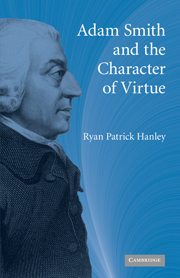Book contents
- Frontmatter
- Contents
- Preface
- Acknowledgments
- Abbreviations
- Introduction
- 1 The Problem: Commerce and Corruption
- 2 The Solution: Moral Philosophy
- 3 Interlude: The What and the How of TMS VI
- 4 Prudence, or Commercial Virtue
- 5 Magnanimity, or Classical Virtue
- 6 Beneficence, or Christian Virtue
- Epilogue: The “Economy of Greatness”
- Index
- References
3 - Interlude: The What and the How of TMS VI
Published online by Cambridge University Press: 06 November 2009
- Frontmatter
- Contents
- Preface
- Acknowledgments
- Abbreviations
- Introduction
- 1 The Problem: Commerce and Corruption
- 2 The Solution: Moral Philosophy
- 3 Interlude: The What and the How of TMS VI
- 4 Prudence, or Commercial Virtue
- 5 Magnanimity, or Classical Virtue
- 6 Beneficence, or Christian Virtue
- Epilogue: The “Economy of Greatness”
- Index
- References
Summary
THE WHAT: SMITH'S “PRACTICAL SYSTEM OF MORALITY”
To this point our focus has been diagnostic; our aim, that is, has been to identify the two principal ills, one political and the other philosophical, that con-cerned Smith with regard to the question of virtue. Now we must turn from the diagnostic to the therapeutic. Smith's study of the character of virtue in TMS VI seeks to propose remedies for both the political problem of commercial corruption and the corruption of modern ethics. To appreciate these proposed remedies, it is necessary to examine briefly the context and intentions of the sixth edition revisions.
TMS VI is the longest of the five major revisions and additions to which Smith calls his readers' attention in the Advertisement prefaced to the 1790 publication of the sixth edition (see TMS Advertisement.1). Yet scholars have reached differing assessments of the significance and sophistication of these revisions. The least charitable view holds that the sixth edition revisions are the pointless pottering of an “elderly and unwell” Smith who wrote in an elliptical style even in his prime (a view that seems to vindicate Smith's own claim that “very little can be either expected or hoped from the old man” (TMS VI.ii.1.3)). Others have argued that the sixth edition merely brings into even greater relief claims already present, if less developed, in earlier editions.
- Type
- Chapter
- Information
- Adam Smith and the Character of Virtue , pp. 82 - 99Publisher: Cambridge University PressPrint publication year: 2009



